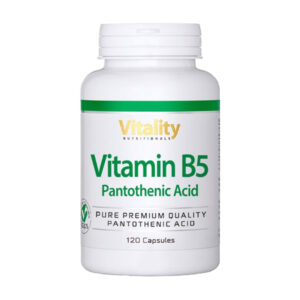Vitamin B5
-Plant extracts
1.High quality plant extracts;
2.Organic and Natural;
3.Better stability.
Share the product
Product information

Product Properties
Product Name: vitamin B5
Synonyms: Vitamin B5; Pantothenic acid calcium salt; D-(+)-Pantothenic acid calcium salt
CAS NO: 137-08-6
Molecular Formula: C18H32CaN2O10
Molecular Weight: 476.54
Assay: ≥98.5%
Appearence:White needle crystalline powder
Grade Standard: Food Grade, Medicine Grade
Detailed Description
Pantothenic acid is a vitamin, also known as vitamin B5. It is widely found in both plants and animals including meat, vegetables, cereal grains, legumes, eggs, and milk.
Vitamin B5 is commercially available as D-pantothenic acid, as well as dexpanthenol and calcium pantothenate, which are chemicals made in the lab from D-pantothenic acid.
Pantothenic acid is frequently used in combination with other B vitamins in vitamin B complex formulations. Vitamin B complex generally includes vitamin B1 (thiamine), vitamin B2 (riboflavin), vitamin B3 (niacin/niacinamide), vitamin B5 (pantothenic acid), vitamin B6 (pyridoxine), vitamin B12 (cyanocobalamin), and folic acid. However, some products do not contain all of these ingredients and some may include others, such as biotin, para-aminobenzoic acid (PABA), choline bitartrate, and inositol.
Functions
1.It can be resistance to fatty liver, promote storage of vitamin A in liver.
2.It can promote cell mature and body metabolism.
3.It participates in the manufacturing of bone marrow RBC, so it can be the treatment of pernicious
anemia.
4.It increases folic acid utilization rate, promote carbohydrate, fat and protein metabolism.
Applications
In commercial supplement products, pantothenic acid (vitamin B5) is available as Calcium D-pantothenate for its bad stability in nature.Our Calcium D-pantothenate can be used to produce optimal nutritional
supplements.
Pantothenic acid is essential to all life, and is a component of coenzyme A (CoA), a molecule that is
necessary for numerous vital chemical reactions to occur in cells. Pantothenic acid is essential to the
metabolism of carbohydrates, proteins, and fats, as well as for the synthesis of hormones and cholesterol.


